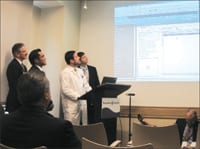Health Care: Let’s Build on What We Know
An article in the New Yorker earlier this year by Dr. Atul Gawande explained the rationale for creating a national health care system based on the fundamentals of existing programs. Gawande provided a terrific overview of the origins of health care systems in other parts of the world, and it is instructive for us as we embark upon our own journey toward universal health care.
His premise is that every nation that has a successful national health plan has built it upon what existed within its own borders — imperfect and patchworked, but foundational nonetheless. I agree with him that that is what America must do rather than create a government-run health plan, or any system that reproduces what is done in Canada, Great Britain, or elsewhere. Building upon employer-based, private health insurance has proven merit.
The advocates of a government-run plan claim that it will control costs. I am not convinced. The allure of a government-run health plan is distracting and unproven, and brings a high risk of unintended consequences such as reducing competition and consumer choice.
Moreover, even if a government-run plan could be designed in a way that preserves choice for most Americans, it would delay the start of universal coverage for years. As a nation, we simply cannot afford to wait for the kind of accessible, portable, universal health care coverage that we have available to us today in Massachusetts, or to employees eligible for coverage through the Federal Employees Health Benefits Plan, which was touted during President Obama’s campaign.
Our experience offers a real-time example of what can be achieved when there is a successful public/private partnership. The Commonwealth’s citizens have long enjoyed the promise that health care won’t be denied due to a prior health condition. We haven’t had to make the choice between bankruptcy and treatment for serious disease, endure waiting periods before receiving health care coverage, or pay hospitals upfront for life-or-death care. The lack of this protection elsewhere contributes to the sense of urgency felt in most of the country.
We have already learned that, for health care reform to be successful, individual mandates encourage widespread adoption, timing and a united will can create a workable solution, and incentives must be aligned. This public/private partnership has successfully met the needs of more than 97{06cf2b9696b159f874511d23dbc893eb1ac83014175ed30550cfff22781411e5} of the state’s citizens and could be a blueprint for private market reform, as we understand what can be reasonably accomplished in a set time frame, what can be improved upon, and where the focus should be for achieving sustainable change while maintaining choice, quality, and affordability.
In addition, there is much that we do here in Massachusetts that the president wants the rest of the nation to adopt, such as our leadership in electronic medical records, our commitment to quality through innovative payment models for providers, and our adherence to evidence-based medicine. Of course, this isn’t to say that our state system is perfect, but theoretical perfection should not hold us hostage as we embark upon an idea whose time has finally come.
We inhabit a unique moment; unlike 1993, we are engaged in a much different discussion. The country’s insurance industry is now a key supporter and stakeholder, and has already signaled its willingness to be part of the national solution.
For example, America’s Health Insurance Plans, a national trade association on whose board I sit, has submitted its own comprehensive health care reform proposal to achieve universal coverage, reduce the unsustainable increase of health care costs, and improve the quality of medical care. No less a national health care advocate than Sen. Ted Kennedy said of AHIP’s efforts, “the insurance industry has advanced serious proposals that deserve serious analysis and consideration.”
As Gawande suggests, let us learn from the experience of others who successfully crafted health care systems built upon existing foundations. We cannot afford to be distracted. Today’s confluence of will, momentum, and the coming together of stakeholders is rare and must not be squandered.-
James Roosevelt Jr. is president and CEO of Tufts Health Plan and co-chair of the policy committee of America’s Health Insurance Plans.


